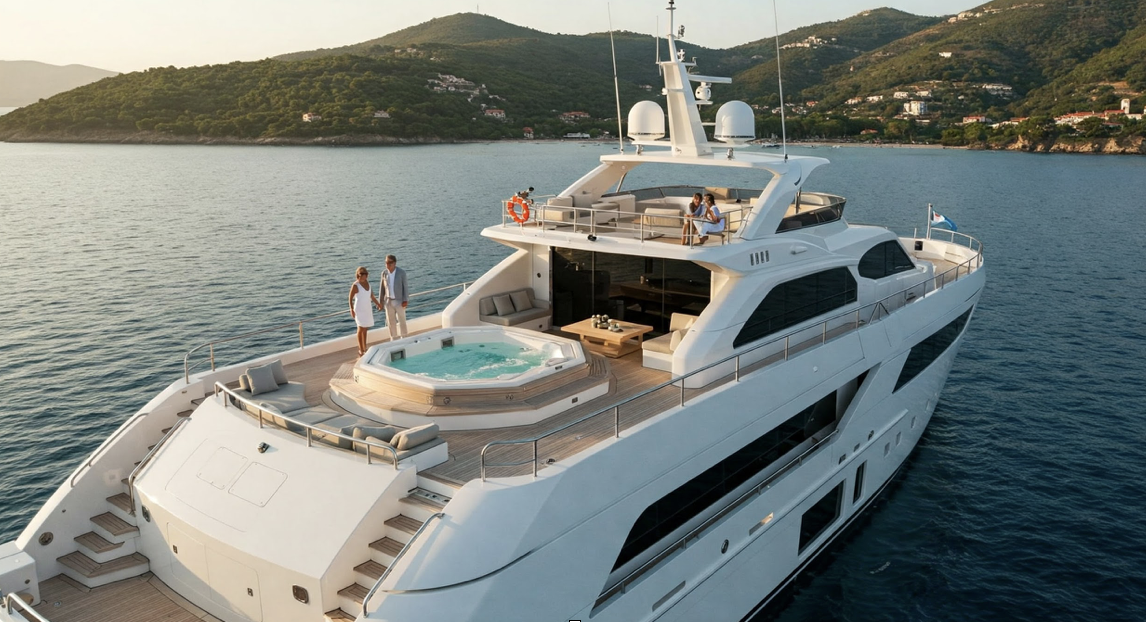
Toronto’s waterfront has seen extensive redevelopment over the past decade, particularly in areas like Queens Quay and Harbourfront Centre, where mixed-use planning has combined residential, commercial, and recreational functions.
Marinas such as Outer Harbour Marina and the National Yacht Club now support a more active boating community, offering seasonal berthing, maintenance services, and access to organized sailing events.
Let’s dive deeper into how Toronto redefines the super yacht lifestyle.
The Rise of Toronto’s Waterfront Culture
In 2023, the Canadian yacht market generated USD 393.8 million in revenue, with continued growth projected through 2030. Toronto’s role within this landscape is growing, with infrastructure improvements drawing interest from buyers who may have previously favored U.S. or European markets.
The city also hosts the annual Toronto International Boat Show, one of North America’s most significant indoor events, attracting over 70,000 attendees. This positions Toronto as both a regional boating hub and a credible player in the evolving superyacht market.
Developments like Four Seasons’ luxury yacht experience signal growing interest in high-end maritime travel more broadly, which may influence how local buyers think about usage, service expectations, and lifestyle integration.
A Hub for Modern Yacht Ownership
As interest in yachting expands across Canada, Toronto has positioned itself as a practical base for both seasoned owners and new entrants to the market. The city offers a full-service ecosystem tailored to local conditions, including winter storage, haul-out services, maintenance facilities, and a strong network of licensed brokers. This level of infrastructure allows for long-term vessel ownership, even in a seasonal climate.
In a shifting market landscape, where new boat orders have slowed and inventory has grown, buyers are increasingly turning to high-quality pre-owned vessels. Toronto’s brokerage scene has responded with expanded listings and tailored services for clients seeking flexibility and long-term value. For those exploring entry points into the market, there are a variety of used yachts for sale in Toronto that offer a practical and well-supported alternative to new builds.
Innovation from Canadian Yacht Builders
While Canada may not rival the scale of European shipyards, it has steadily developed a reputation for high-quality superyacht construction and engineering. A handful of manufacturers, concentrated in British Columbia and Ontario, are producing vessels that combine precision craftsmanship with regional durability.
Among them, Crescent Custom Yachts in Richmond, BC, is recognized for producing luxury custom yachts like the Crescent 145, a 44.2-meter vessel designed by industry leaders Jack Sarin and Jonathan Quinn Barnett. The company employs top-tier naval architects and designers, creating vessels that blend performance with aesthetic refinement.
Nearby in Delta, West Bay SonShip Yachts focuses on semi-custom motor yachts in the 60–110 ft range, known for reliability and finish. Philbrook’s Boatyard in Sidney complements this with over 50 years of experience in custom builds and refits for vessels up to 130 ft.
Canada is also home to internationally respected design firms such as Gregory C. Marshall Naval Architect Ltd., which has contributed to over 400 yacht projects, and Bray Yacht Design, known for innovative hull designs and fuel-efficient configurations.
This ecosystem supports a growing market. In 2023, Canada’s yacht sector generated USD 393.8 million, with superyachts accounting for the largest share (30.07%). As demand rises for custom, climate-resilient vessels, Canadian builders are gaining traction among buyers seeking both performance and personalization.
Toronto Buyers Prioritize Value, Flexibility, and Function
While customization remains a consideration, yacht buyers in Toronto are increasingly prioritizing practical value, resale flexibility, and long-term serviceability. Market conditions have shifted in their favor: new boat orders are slowing, inventories are high, and pre-owned vessels over $1.5 million have seen significant price adjustments. For buyers, this presents opportunities to secure well-equipped yachts at more competitive terms.
Rather than commissioning fully bespoke builds, many Toronto-based owners are opting for high-quality used yachts that can be adapted post-purchase. Refits and upgrades—ranging from layout changes to electronics and winterization—are often managed through local yards or brokers. This approach supports a more flexible ownership model that accounts for regional constraints, such as seasonal operation and access to haul-out infrastructure.
Economic factors also weigh on purchasing behavior. The proposed federal luxury tax on boats over CA$250,000 has raised concerns within the industry, with analysts anticipating millions in lost revenue and potential job cuts.
A Greener Superyacht Future on Lake Ontario
As environmental standards evolve across the marine industry, yacht owners in Ontario are beginning to reflect broader global interest in cleaner propulsion and more efficient vessel design. While Canada is still in the early stages of widespread adoption of hybrid or electric marine technologies, innovation is accelerating, especially at the design and concept level.
Notably, Montreal-based designer Charles Bombardier has introduced visionary concepts like the Seataci, a $100 million superyacht that mimics whale-like propulsion and integrates hydroelectric power. Though still conceptual, projects like these highlight a cultural shift toward sustainability, even in luxury markets.
Design firms such as Gregory C. Marshall Naval Architect Ltd. and Bray Yacht Design have also pushed energy efficiency to the forefront, developing hulls and hybrid-ready systems that reduce drag and fuel consumption. Though Canada lags behind Europe in hybrid adoption, global innovations are starting to influence expectations here. For example, the development of Heesen’s hybrid superyacht reflects how the industry is adapting to environmental mandates without sacrificing design or performance.
As Lake Ontario continues to serve as a base for both leisure and serious yachting, sustainability is expected to play a larger role in future ownership decisions, driven as much by regulation as by shifting consumer expectations.
Explore What Yacht Ownership Looks Like in Toronto
Toronto is not simply catching up to global yachting hubs—it’s developing its own version of the superyacht lifestyle, shaped by practical infrastructure, regionally adapted craftsmanship, and evolving buyer expectations. From well-established local builders to emerging interest in sustainability, the city is quietly expanding its role in the broader yacht market.
For prospective owners, brokers, and marine professionals, Toronto offers a combination of access, expertise, and long-term value that reflects both the strengths of the Canadian market and the specific needs of seasonal operation. Whether exploring a new build, refit, or pre-owned purchase, the city’s maturing ecosystem is well-positioned to support the next generation of yacht ownership.







